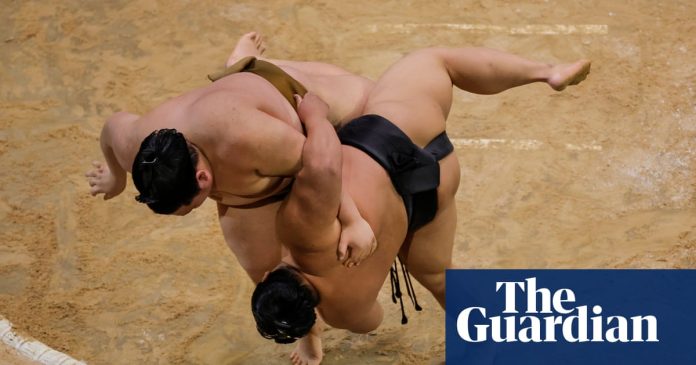Anticipation is building among sumo fans in Japan as they wait to discover if the country’s first female prime minister, Sanae Takaichi, will defy centuries of tradition and step into the sumo ring to present a trophy later this month.
With 11 days of the current 15-day tournament in Fukuoka, south-west Japan, remaining, government officials have left the sport’s devotees guessing with vague comments over the likelihood of clash between Takaichi and the Japan sumo association.
Women are banned from entering, or even touching, the “sacred” dohyo, or arena, due to a belief found in Shinto, Japan’s indigenous religion, that they are “impure” because of menstrual blood.
When asked if Takaichi would push for permission to present the prime minister’s trophy to the winner a week on Sunday, the chief cabinet secretary, Minoru Kihara, did not give a definitive answer.
“The prime minister wishes to respect sumo tradition and culture,” he told reporters this week, according to the Jiji Press news agency. “The government has not yet made a decision on the matter. We will consider an appropriate response based on the prime minister’s will.”
Kihara’s reference to tradition suggests that Takaichi, a social conservative, will avoid reigniting the controversy over professional sumo’s ban on women. Currently, women are permitted to enter the ring, as competitors and referees, only in amateur sumo.
The controversy stretches back to 1990, when Mayumi Moriyama, Japan’s first female chief cabinet secretary, indicated she wanted to present the prime minister’s trophy on his behalf. The sumo association rejected her request, with its chair stating that “there should be at least one organisation like ours”, according to the Asahi Shimbun.
A decade later, Osaka’s then governor, Fuse Ohta, was forced to present a prize to the champion of the annual Osaka tournament on a walkway next to the dohyo after the sumo association rejected her repeated requests to be allowed to enter the ring.
The issue resurfaced in 2018 during an exhibition tournament in Maizuru, near Kyoto, when the local mayor, Ryozo Tatami, collapsed while giving a speech in the centre of the dohyo.
Several female spectators, including a nurse, rushed on to the ring to administer first aid to Tatami, who had suffered a stroke, prompting the referee to repeatedly call over the PA system for them to step off it. The women refused to leave.
Officials sprinkled “purifying” salt on the wrestling surface after they had finished tending to Tatami, although sumo officials denied that had been done because of the women’s presence in the ring. Salt is customarily scattered on the ring before bouts and after a wrestler has been injured.
The incident caused an outcry, forcing the chair of the sumo association, Hakkaku, to apologise for the referee’s “inappropriate actions”.
Days later, however, the sport’s guardians came under fire again after refusing to allow Tomoko Nakagawa, the then mayor of Takarazuka, to deliver a speech from the dohyo before an exhibition tournament. Forced to give her address from the side of the ring, Nakagawa drew applause from spectators when she said she felt “mortified” by her treatment as a woman.
In 2019, the sumo association formed a panel of outside experts to look into the ban on women, but it has yet to reach a conclusion, the Asahi reported this month.
Some prime ministers – most recently Shigeru Ishiba – have presented a trophy to the winner of the elite makuuchi division, while others have been represented by government officials.
The sight of Takaichi stepping on to the dohyo would not only be a symbolic victory for women’s rights campaigners; it would do no harm to her politically as she tries to revive her party’s political fortunes.
Many of sumo’s followers believe the sport has entered a golden age after it was rocked by scandal, including allegations of bullying and violence in sumo stables, where wrestlers live, eat and train together under the watchful eye of their stablemaster.
Tickets for the six annual tournaments quickly sell out, while local fans celebrated this year when Onosato became the first Japan-born yokozuna grand champion for eight years. The sport, which some say stretches back more than 1,500 years, is also basking in the afterglow of a wildly successful tournament at the Royal Albert Hall – its first appearance in the UK for 34 years.








